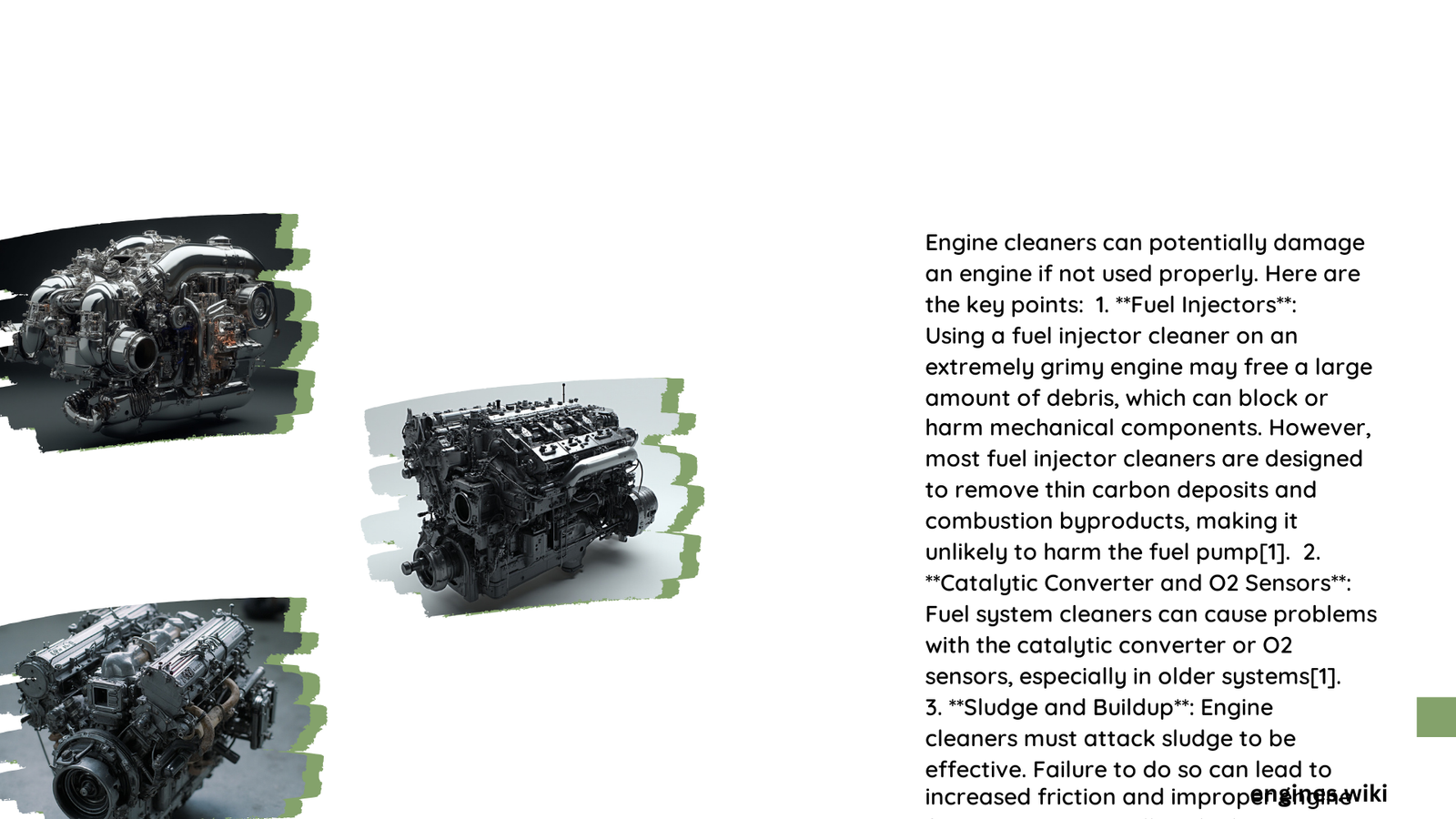Engine cleaners are widely used to maintain and improve engine performance, but concerns about potential damage persist. While most engine cleaners are designed to be safe when used correctly, improper application or use of incompatible products can indeed cause harm. This article explores the potential risks associated with engine cleaners, their effects on different engine types and materials, and provides safety measures to prevent damage.
What Are the Potential Risks of Using Engine Cleaners?
Engine cleaners, while generally beneficial, can pose risks to your engine if not used properly. Here are some key concerns:
- Chemical Composition: Some cleaners contain harsh chemicals that can corrode certain engine materials.
- Improper Application: Overuse or misapplication can lead to mechanical issues.
- Debris Release: In extremely dirty engines, cleaners may dislodge large amounts of debris, potentially clogging components.
- Material Incompatibility: Certain cleaners may react negatively with specific engine materials.
Chemical Compositions and Their Effects
Different engine cleaners have varying chemical compositions, some of which can be harmful to engine components:
-
Purple Power: This degreaser is notorious for causing significant damage to aluminum components. It can lead to severe corrosion, leaving a white residue on parts like the engine block and cold air intake. The corrosion can be so severe that it chemically bonds to the metal surface, necessitating extensive cleaning or even part replacement.
-
Fuel System Cleaners: While generally safe, these cleaners can potentially cause issues if not used correctly. They might release a large amount of debris in extremely grimy engines, potentially blocking or damaging mechanical components.
| Cleaner Type | Potential Risks |
|---|---|
| Purple Power | Severe aluminum corrosion |
| Fuel System Cleaners | Debris release, potential clogging |
| Generic Degreasers | Plastic staining, residue buildup |
How Do Engine Cleaners Affect Different Engine Types and Materials?

The impact of engine cleaners can vary depending on the engine type and the materials used in its construction.
Gasoline vs. Diesel Engines
-
Gasoline Engines: Fuel system cleaners are particularly important for gasoline engines, especially those running on ethanol-blended fuel. They help remove harmful deposits and prevent new ones from forming. However, improper use can lead to issues like clogged mechanical components or damage to the catalytic converter and O2 sensors.
-
Diesel Engines: While there’s less specific data on the effects of engine cleaners on diesel engines, the general principles of avoiding corrosive cleaners and ensuring compatibility with diesel fuel systems apply.
Effects on Various Engine Materials
- Aluminum: Highly susceptible to corrosion from certain cleaners like Purple Power. Damage can be severe and costly to repair.
- Plastic: Engine degreasers can leave stain residues on plastic parts, potentially causing dulling marks if not properly rinsed.
- Steel and Other Metals: Generally resistant to most engine cleaners, but it’s crucial to avoid cleaners that can react with specific alloys.
What Are the Symptoms of Engine Damage Caused by Cleaners?
Recognizing the signs of engine damage from cleaner use is crucial for timely intervention:
- Unusual Noises:
- Misfires
- Rough idling
-
Knocking sounds
-
Performance Issues:
- Stumbling or bucking at low speeds
- Decreased acceleration
-
Increased fuel consumption
-
Visual Signs:
- White residue on aluminum parts
- Corrosion on metal surfaces
-
Stain residues on plastic components
-
Emission Problems:
- Increased exhaust smoke
- Failed emissions tests
How Can You Safely Use Engine Cleaners?
To minimize the risk of engine damage, follow these safety measures and recommendations:
Application Techniques
- Fuel System Cleaners:
- Follow manufacturer’s instructions precisely
- Avoid overuse, especially in extremely dirty engines
-
Use the recommended amount for your engine size
-
Engine Degreasers:
- Ensure the engine is cool before application
- Cover electrical components to prevent water or degreaser damage
- Spray liberally, scrub heavily stained areas
- Let sit briefly, then rinse thoroughly with a power washer
- Allow engine compartment to dry completely before closing the hood
Safety Precautions
- Material Compatibility: Always check if the cleaner is compatible with your engine’s materials
- Protective Gear: Wear gloves and eye protection when applying cleaners
- Ventilation: Work in a well-ventilated area to avoid inhaling fumes
- Disposal: Properly dispose of used cleaners and runoff according to local regulations
By understanding the potential risks and following proper usage guidelines, you can effectively use engine cleaners while minimizing the risk of damage to your engine. Always prioritize safety and consult with a professional if you’re unsure about using a particular product on your engine.
